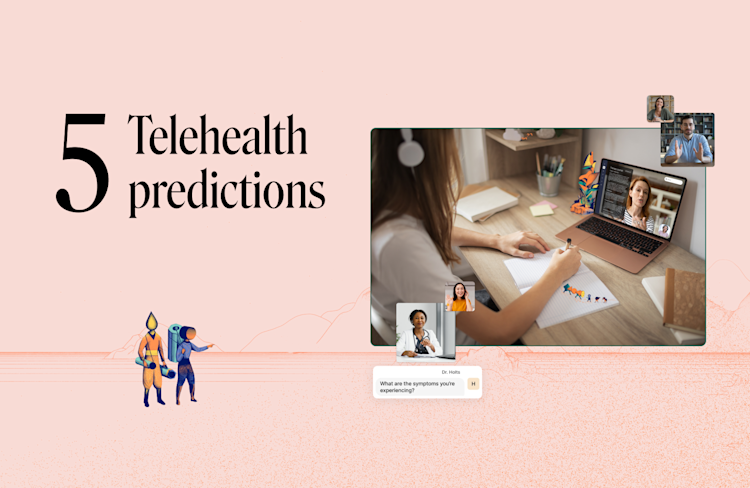Shaping the Future of Mental Health Care Through Technology
Several key areas are poised to revolutionize mental health care, from the battle against stigma to advancements in AI and the growth of virtual therapy.

In recent years, mental health care has increasingly become a focal point of global health discussions. The pandemic brought mental health issues to the forefront, revealing both challenges and opportunities for improvement. But with one in eight people globally living with a mental health disorder (WHO, 2022) and 51% of 18-24 year olds feeling lonely some or all of the time (AXA, 2024), there is still a long way to go to improve access, reduce stigma and democratize mental health care.
As we look towards the future, several key areas are poised to revolutionize mental health care; advancements in artificial intelligence (AI), the emphasis on prevention and continued care, the ongoing battle against stigma, government and institutional responsibilities, and the power of virtual therapy. Let's delve into these areas to understand how they are shaping the future of mental health care.
The importance of early intervention and continued care
Mental health issues are often chronic and episodic, requiring ongoing management rather than a one-time treatment. Early intervention is crucial, but it can only be effective if the stigma surrounding mental health is reduced. Encouraging early intervention requires a cultural shift in how mental health is perceived and discussed. Globally 12 billion work days are lost every year due to depression and anxiety (WHO, 2022), yet only 43% of those who have experienced these conditions have spoken to a mental health professional (Wellcome Trust, 2020).
There is a combined effect of lack of support from employers, stigma and limited education on both how to identify symptoms and what to do to get help. Only by addressing these issues can mental health conditions be identified early and those affected encouraged to seek professional help.
Continued care is equally important. Many therapies end too soon to have a long-term impact, leading to a risk of relapse. Embedding healthy behaviors and maintaining consistent support can help manage mental health conditions more effectively. This sustained effort is essential for reducing relapse rates and ensuring long-term mental well-being.
Battling the stigma of mental health
Mental health stigma is an epidemic. It remains one of the biggest barriers to effective mental health care and requires multi-institutional action to combat it. Understanding the biological basis of mental health conditions can play a significant role in reducing stigma. Education about the science behind mental health can demystify conditions and foster empathy and support.
Employers also play a crucial role in combating stigma. By fostering open conversations and using positive language, such as referring to therapists as "psychology coaches," employers can create a more supportive environment. According to a report by AXA, employees are 3 times more likely to have “flourishing” mind health when they feel supported by their employer. Providing an open, supportive environment can increase engagement and access to mental health resources, particularly in workplace settings.
The increase in public conversations around mental health in the media also helps to bring issues to the forefront. With high profile public figures such as Gymnast Simone Biles, singers Billie Eilish and Nicki Minaj and actors Ryan Reynolds and Maisie Wiliams (among many others) openly discussing their mental health and how it has affected their careers, discussion is normalized and encouraged. The recent announcement of TikTok and the WHO joining forces to collaborate on delivering science-based mental health and wellbeing information shows an institutional commitment to increasing awareness and reducing stigma.
Government and institutional responsibility
Government policies and educational initiatives have significantly reduced mental health stigma among younger generations. However, systemic issues persist, including a lack of clarity on the next steps beyond self-care for those needing help. The pandemic highlighted these gaps but also sparked conversations that need to be continued and expanded upon.
Mental health is a substantial financial burden on healthcare systems, yet on average less than 2% of healthcare budgets are allocated to mental health services globally (WHO, 2022). Governments must prioritize mental health in their public health strategies and allocate adequate resources for education, treatment and prevention. Legislation and public health campaigns can play a pivotal role in reducing stigma and improving mental health care access and quality.
The power of virtual therapy
Virtual therapy has emerged as a powerful tool in mental health care. Integrating video solutions into the care pathway will be an effective way to increase accessibility. Remote access can be particularly beneficial for individuals who feel shame or embarrassment about their conditions, such as those with eating disorders. The flexibility and anonymity offered by virtual therapy can help overcome barriers created by stigma and make mental health care more accessible.
Research indicates that digital technologies, including telemedicine and self-help approaches, can significantly contribute to universal mental health coverage. These technologies reduce travel time and expenses, fit around daily schedules, and offer a degree of privacy that can encourage more people to seek help.
Harnessing AI for mental health
Artificial intelligence also holds immense potential in transforming mental health care, particularly when combined with existing systems and technologies. By leveraging vast amounts of data and remote patient monitoring, AI can identify patterns and alert patients and practitioners to potential health issues early on. This proactive approach enables timely intervention, potentially preventing the escalation of mental health conditions.
However, the role of AI in mental health is not to replace healthcare professionals but to enhance their capabilities and improve efficiencies. For example AI can streamline tasks during virtual therapy sessions, such as transcriptions and note-taking, allowing professionals to focus more on patient care. Furthermore, AI can provide valuable insights and data, supporting clinicians in making informed decisions. This symbiotic relationship between AI and healthcare professionals can significantly improve the quality and efficiency of mental health care.
Supporting a stretched workforce
We are facing a global shortage in mental health specialists, with around half of the global population living in countries where there is just one psychiatrist to serve 200 000 or more people (WHO, 2022). Harnessing technologies such as video call services and AI can help reduce some of the pressures and streamline processes to enable wider care opportunities. One of the top reasons that people stop seeking help with mental health conditions is due to poor quality of services available (WHO,2022). While clearly more needs to be done to increase the number of professionals available, technology can assist the existing practitioners in servicing more patients effectively.
A collaborative future
With 92% of people worldwide believing that mental health is as important or more important than physical health (Wellcome Trust, 2020), it is clear that there is appetite to improve and maintain mind health. The issues lie in identifying symptoms, knowing how and when to seek help, the quality and accessibility of care available and prevalence of ongoing support. From governments and schools to employers and technology companies, there are significant improvements still to be made. A combined effort is needed both individually and systemically to achieve better global mind health. The outlook is promising; stigma is slowly reducing, governments are taking mental health issues more seriously and technology is advancing to help provide better, more accessible mental health care.


